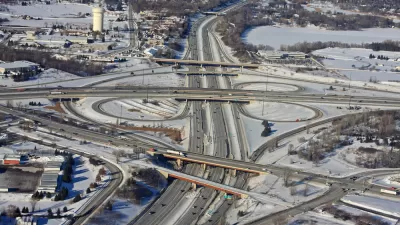Even as density increases in Minneapolis, affordable housing is not going to be accessible to the people who need it, according to an article by James S. Russell.

While the Minneapolis 2040 plan took the bold step of ending of single-family zoning, housing is still out of reach for the city’s low- and moderate-income residents, writes James S. Russell. Allowing multi-unit buildings throughout Minneapolis will increase density, but rents are still on the rise and poor people are being displaced.
"The Minneapolis plan only indirectly addresses the needs of those low-income residents, relying on the market to lower rents by adding to the supply. While developers are already eyeing single-family houses to convert to duplexes and triplexes, many experts believe there is little evidence that adding market-rate units will have a trickle-down effect in thriving cities," says Russell.
Russell notes that upzoning in other cities, such as New York and Seattle, has resulted in an influx of more expensive units but not the lower-rent housing that these cities desperately need. "Without a more robust policy to address housing costs for those most affected by the tightening market in Minneapolis, the 2040 plan could produce the result opponents have feared: the wrong kind of new housing and a continuing concentration of poverty."
FULL STORY: Minneapolis and the End of the American Dream House

Planetizen Federal Action Tracker
A weekly monitor of how Trump’s orders and actions are impacting planners and planning in America.

Congressman Proposes Bill to Rename DC Metro “Trump Train”
The Make Autorail Great Again Act would withhold federal funding to the system until the Washington Metropolitan Area Transit Authority (WMATA), rebrands as the Washington Metropolitan Authority for Greater Access (WMAGA).

DARTSpace Platform Streamlines Dallas TOD Application Process
The Dallas transit agency hopes a shorter permitting timeline will boost transit-oriented development around rail stations.

Renters Now Outnumber Homeowners in Over 200 US Suburbs
High housing costs in city centers and the new-found flexibility offered by remote work are pushing more renters to suburban areas.

The Tiny, Adorable $7,000 Car Turning Japan Onto EVs
The single seat Mibot charges from a regular plug as quickly as an iPad, and is about half the price of an average EV.

Supreme Court Ruling in Pipeline Case Guts Federal Environmental Law
The decision limits the scope of a federal law that mandates extensive environmental impact reviews of energy, infrastructure, and transportation projects.
Urban Design for Planners 1: Software Tools
This six-course series explores essential urban design concepts using open source software and equips planners with the tools they need to participate fully in the urban design process.
Planning for Universal Design
Learn the tools for implementing Universal Design in planning regulations.
Municipality of Princeton
Roanoke Valley-Alleghany Regional Commission
City of Mt Shasta
City of Camden Redevelopment Agency
City of Astoria
Transportation Research & Education Center (TREC) at Portland State University
US High Speed Rail Association
City of Camden Redevelopment Agency
Municipality of Princeton (NJ)





























